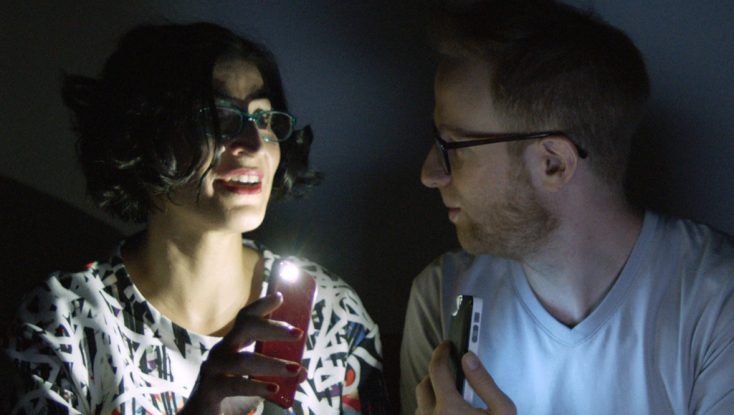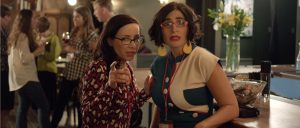By ANGELA DAWSON
Front Row Features
HOLLYWOOD—Among the less destructive events that followed 2012’s Hurricane Sandy was a power blackout that lasted two or three days in parts of Manhattan. New Yorkers actually had to communicate face-to-face rather than via text or emails. Some even resorted to delivering hand-written messages. They checked in on their elderly neighbors and held spontaneous neighborhood “Blackout” parties, getting rid of perishable foods that had to be eaten before they rotted.
Comedian Negin Farsad, who lived through those dark hours in the East Village, saw the potential for a hearty romantic comedy from that event, the result of which is “3rd Street Blackout,” available on VOD and digital Tuesday July 5. She co-wrote and co-stars in it with fellow comedian Jeremy Redleaf. They play a typical Millennial couple that feels most comfortable communicating with each other via Smartphone. As Mina, she’s a neuroscientist who has returned home from a Ted Talk in California where she may or may not have had a one-night-stand with a handsome billionaire investor. Rudy, her professional computer hacker boyfriend, is initially clueless, but as the darkness descends and the interloper shows up unexpectedly for their Blackout party, the couple’s relationship is fractured and each has to determine if and whether they want to reconcile.
An Iranian-American born in Connecticut and raised in laid-back Palm Springs, Calif., Farsad has shared her brand of observational comedy with audiences via TV, film and stand up for about a decade. She left a promising and lucrative career as a public policy advisor for the City of New York to make people laugh. Her comedy centers on politics, sex, growing up Muslim and dealing with anti-Islamic bigotry. She’s produced a handful of documentaries including 2013’s satirical “The Muslims Are Coming!” and she recently published her first book “How to Make White People Laugh.” Having produced, directed and starred in Comedy Central’s “The Watch List,” she is now in development on a TV series for Warner Bros.
The busy comedian spoke by phone from New York about her new film and what’s ahead.
Q: No blackouts there today?
Farsad: It’s hot and people are probably overusing their air conditioners so who knows?
Q: Hopefully, you’re better prepared than Mina, your “3rd Street Blackout” character.
Farsad: I’ve got a lot of candles left over from the shoot so I’ll be OK.
Q: What was the inspiration for the film?
Farsad: This is basically what happened to me during Hurricane Sandy. I had a dude at the time. It was a heightening of romantic intentions and declarations of love and all kinds of things. Some stuff, like Ed Weeks’ character (Nathan, the wealthy investor) being a hurdle, was made up but during the actual blackout we played songs on the piano. I actually live on Third Street. I’m a Ted fellow, although for comedy not for neuroscience. The characters of the Chillmaster and the bodega guy around the corner are real. My relationship with the guy didn’t work out so ***** that guy! I actually now live with (a new) boyfriend.
Q: How did the Ted talk you give in the film compare with your actual experience?
Farsad: I went to my first Ted conference in 2013. That’s where I encountered the billionaires—hedge fund people and venture capitalists. They go to these conferences to look for the latest thing to (invest) their money. The inspiration for the Ed Weeks’ character was me seeing these people and having a brush with them. They weren’t interested in me, though, because I’m a comedian. I don’t offer anything at all to their livelihood.
Q: What did you talk about? Were you nervous?
Farsad: The most recent one was two weeks ago. I do my brand of comedy: social justice comedy. I talked about ways I fight bigotry and Islamophobia. I treat is as an opportunity to perform it with only PowerPoint rather than regular standup. I was slightly lampooning the Ted talk format while also doing the Ted talk format. It is kind of scary because you think, “I’m on the Ted stage!” The Ted staff is very thorough and holds your hand the entire way. If I were an actual scientist, it would be a little more traumatic. I just had the regular performer nerves.
Q: How long after Hurricane Sandy did you and Jeremy Redleaf write this?
Farsad: We started writing the script about a year after Sandy. It all happened very quickly.
Q: Being an Iranian-American, I can’t imagine you run into many other Muslim comedians in your line of work.
Farsad: No.
Q: You initially were in government service. Do you feel you’re able to reach more people through comedy?
Farsad: I don’t feel bound by any particular media or genre. My last three feature films were documentaries. The last was a tour doc called “The Muslims are Coming!” where I addressed Islamophobia head-on but there was also stand up and street action and field pieces. We had a great time. I feel that’s more a direct way to address that issue. And then to go into a movie like this where we can talk about social fragmentation and the decaying of social capital but through the lens of a blackout and through the romantic comedy genre, it makes the issues more accessible. It might work on a more subconscious level. People can watch this movie and just have a good time. Lurking underneath is the message, “we need to put our phones down and meet each other.” Otherwise, community bonds will disintegrate and we’ll turn into weird silos that all hate each other.
I was a policy adviser for the City of New York right out of grad school where I got degrees in public policy and African-American studies. I still believe in that work but I believe that you can attract more flies with honey and have softer punches when you’re wearing a clown nose. Culture has that ability.
Q: You grew up in Palm Springs, Calif., near L.A. Do you prefer New York over L.A.?
Farsad: I was little when we moved to Palm Springs. I was a desert girl and thought it was normal. I didn’t think it was weird to live around senior citizens and being the only kid in my neighborhood. At college (at Columbia University), I fell in love with a city that creates a lot of interpersonal collisions. It may be evident in the movie. I love community. I love my neighbors and having these weird interactions with the bodega guy and the dry cleaner and knowing about their lives. New York really offers that. New York creates these expectations of an urban lifestyle that’s very hard for other cities to live up to. That’s why L.A. hasn’t been on my radar as much.
Q: Did you take film classes or screenwriting classes?
Farsad: I never took a film class or anything like that. I learned by being on the job and having the ridiculous notion that I could do it. Not that I could do it well, but that I could complete it. That’s the same for standup. I wrote a book that came out a few weeks ago called, “How to Make White People Laugh.” I’d never written a book before. At the end of the day, it’s not rocket science. You can muddle your way through it and get better with each subsequent attempt.
Q: Do you think you’ll continue doing film or would you like to do TV or continue with standup?
Farsad: I have a show in development with Warner Bros. so we’ll have to wait and see what happens with that. I’m unbound by genre. I’ll put up a mime show if I think it will be interesting and if I can say something through it. I love movies and television and I want to continue doing both of those things. One thing that worries me about movies is that it feels like the independent film world gets fewer and fewer screens. That makes me want to fight more for this media because I grew up on it and I feel it’s important because I’ve had such seminal moments watching these movies. We should have some kind of respite from the kind of fantasy world, big-budget tent pole features.
Q: In real life, how long could you survive without your computer or Smartphone?
Farsad: The great thing about the blackout was that no one’s phone was working. It wasn’t like just I was missing out on something, everybody was. It was national news; everyone knew it was happening. So that I could do forever. If we lived in a society where we all didn’t have it that would be awesome. In some ways, I feel like I was born too late. Even though we had Internet and email by the time I was in middle school or high school, I still feel like I was born too late. I don’t necessarily love it. So if no one had it, I could (live without electronic communications) forever. But if it were just me falling off the grid, I feel like I’d just lose work.






